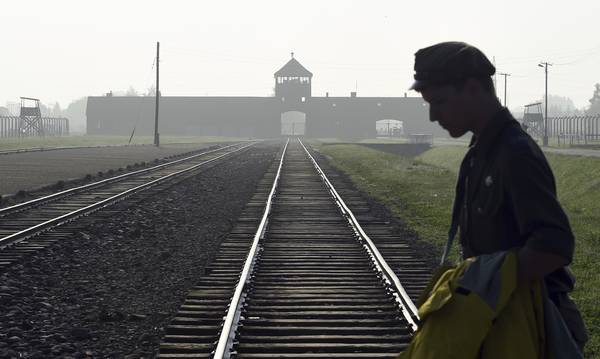70 years ago Pilecki's execution disclosed Auschwitz horrors
After his anti-Nazi struggle he was persecuted by Stalinists
25 May, 09:07by Marco Patricelli
(ANSA) - TRIESTE - A gunshot in the back of the head, in a dark underground cell in the Warsaw prison. On May 25, 1948, the cavalry captain Witold Pilecki was killed by a uniformed executioner, who was rewarded with the standard fee of 1000 zlotys. Pilecki was a man who did not hesitate to sacrifice everything, even his life, for freedom. And this is not a rhetorical device. The Polish officer in 1940 had voluntarily gone to Auschwitz on a secret mission: he wanted to find out what really was happening in the Nazi concentration camp, inform the Allies, organize a resistance network, raise a revolt at the most opportune moment.
Pilecki, one of the founders of the Polish underground movement after the German and Soviet invasion in 1939, was arrested by chance during a raid by the Germans in the streets of Warsaw on 19 September 1940. He assumed the false identity of Tomasz Serafinski and was deported to Auschwitz, where the Nazi criminal system immediately manifested itself in its incredible ferocity. What had filtered outside until then was nothing compared to what happened daily under his eyes.
In November, Pilecki-Serafinski had managed to send out his first report on Auschwitz, which, through a twisted itinerary from occupied Poland to neutral Sweden, finally arrived in March 1941 in London, where the Polish government was in exile.
Everything that was written in that report was absolutely true, but was considered exaggerated. What Pilecki told was history: a gallery of horrors that was unprecedented. His report was the first ever on Auschwitz. Pilecki was able to inform the Allies on collective punishments, deportations, mass murders at the Death Wall or in the gas chambers, the Shoah, but he will never get what he asked for: an air attack that could trigger a revolt of the detainees, helped from outside by the Polish underground army. For this purpose he had worked on the creation of a resistance network with thousands of adherents infiltrated in all the key areas of the lager.
When the political department of the SS discovered the existence of this organization, Pilecki was forced to escape.
After 947 days of inhuman imprisonment, during which he often escaped death, selections, illnesses, and the whims of sadists, Pilecki fled the camp with two companions, who then fight alongside him in the desperate Warsaw uprising in August 1944.
After the surrender, Pilecki was about to be deported to a concentration camp for officers, but once again the use of a false name allowed him not to be identified as the prisoner of Auschwitz number 4859. At the end of the war, Pilecki reached Italy, where the Polish army led by General Anders was deployed.
In 1945 he wrote his final report on Auschwitz in Porto San Giorgio, which today is a cross-section of historical truth.
Poland, meanwhile, was occupied by the Red Army, Stalin established a communist government, the process of sovietization was ruthless and bloody with gunfire, imprisonment, deportations. A network of resistance was created and allowed Poland to hope for a future of freedom and democracy. Pilecki, who fought Nazism beyond imagination, volunteered to fight communism. In Poland there was his wife Maria, whom he had not seen for years, his children Andrzej and Zofia. He was then able to recreate Auschwitz's resistance system but the communist secret services were on his trail. He was arrested, horribly tortured, he attempted suicide in prison but did not bend to all this. Then he was tried, in a typical Soviet farcical trial: the public prosecutor is not even a lawyer, the court is not regular, the prosecution does not need witnesses and the defense can not mention them because either they are dead or they are in jail. Everything Pilecki did at Auschwitz was deleted and the credits were given to Jozef Cyrankiewicz, premier of Soviet Poland (in 1970 even president of the Republic). Forty-seven-year-old Witold Pilecki was sentenced three times to death. On the evening of May 25, 1948, seventy years ago, the "traitorous criminal serving a foreign power", the "enemy of the people" was executed and buried in the night in a secret place in the Warsaw cemetery. A long silence has loomed over him for decades. His body has never been found. (ANSA).














